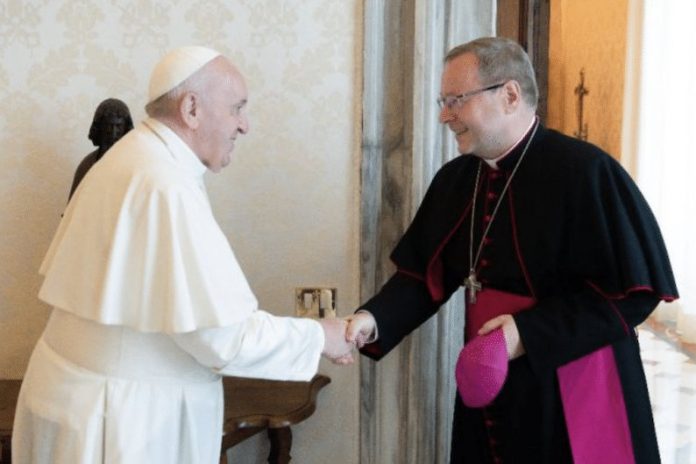When Bishop Georg Bätzing was interviewed about the vote by German bishops to bless same sex unions, the interviewer challenged him about the rationale behind the determination of the bishops to take this schismatic path.
Bätzing stated:
“Homosexual couples, couples who are divorced and remarried, couples asking for a blessing – that’s something we are going to do here.”
The interviewer replied, trying to remind him of the context and the obvious implication of episcopal disobedience, and asked him point blank if they were going to defy the pope.
“Yes, you can do that here, but so far the Vatican has always said it was not allowed to bless homosexual relationships.”
“Does that mean you are going to quasi ‘defy the pope’?” asked the interviewer.
Bishop Bätzing was silent for a moment. He obviously wanted to avoid a straightforward answer of “yes” or “no”.
There was a moment of awkwardness. So he prevaricated and referred instead to the fact that such blessings had been happening already, surreptitiously, but now they were going to make it official.
“For a start, it must be said that the practice of blessing exists and we want to bring it to the light.“
And then he gave a quick summary of his reasoning for defying the Pope, scripture and tradition.
“And that means that we, the bishops, must position ourselves and say that whatever is good in a relationship between two people, can receive God’s blessing. That is only logical.”
This is a rather truncated restatement of the secular trope that when people are attracted to each other and want to have sex, this is “a good thing”.
This analysis or discernment is of course the point at which the German bishops, and indeed German progressive Catholic culture, have parted company with the Faith.
It relies for its foundations on a very different anthropology – a secular rather than a Catholic one. The language on the surface appears to be identical with the language the Church uses every day, and so the assumption follows that the ethics and discernment must be Christian, but they are not.
The first element of departure is a homosexual couple presenting themselves as a couple.
The teaching of the Church is chastity outside heterosexual marriage. The presentation of themselves as a “couple” demonstrates a rejection of that. This is a relationship of affection which has sexual desire and expression at its heart.
The second place of departure is that the request for a blessing of the couple’s experience of each other as “good” is good. Catholic teaching takes a different view. What the Bible, Tradition and the Catechism describe as disordered, cannot be changed into a “good” simply on the grounds that the couple want affirmation instead of repentance, confession and absolution.
But why are so many people convinced that although they pay lip-service to the authority of the Church, the Church must be wrong and change its teaching?
And this is the third point of departure, and perhaps the most serious. The nature of God, who is at one and the same time – compassionate, just, merciful and holy – has been changed. The God of Abraham, Isaac and Jacob, the God who requires Moses to remove his shoes in response to the presence of holiness and who purges Isaiah’s lips with a coal, has been replaced with the grand therapist in the sky.
God is no longer holy; he is inclusive. God no longer divides sheep and goats; he welcomes all. God is not concerned that we change in order to be transformed; the progressive German Catholic Church has required God to change. They have required him to change his nature from holy to wholly-affirming; from judge to therapist; from Maker and Creator hidden in holiness, to aider and abettor of whatever human beings desire most.
This is not the first time that culture has succeeded in imposing its preferred values on the Church.
There was a time one hundred years ago at the outbreak of the First World War when priests were required to bless the army’s cannon and heavy artillery before they were turned on our Christian cousins. The consequences of this proved to be disastrous to Christendom.
These blessings were a deep perversion of the Christian faith. Once again foundational sins were disguised by a different presenting language. Ambition, blood-lust, hyper-nationalism and economic rivalry that drove the Christian nations to war with each other were disguised and presented using language that passed itself off as Christian and profoundly moral: patriotism, courage, duty and nobility.
But in the end, this tragic self-deception would destroy Christendom in Europe (and so weaken Christian culture and self-understanding that it would open Europe up to Islamic domination one hundred and fifty years later). What our ancestors did to rescue us with courage, prayer and Our Lady’s help at Lepanto, the politicians and generals of Europe undid with their stupidity and greed, disguised or justified by the misuse of the language of Christian virtue.
The conversation between Bishop Bätzing and his interviewer continued with the interviewer asking:
“Are you sure that the pope will agree to this?”
To which the bishop replied:
“We will implement it here.”
“After all we have worked in different ways with umpteen persons from among the synodal way, and with experts; we have cited solid texts that extensively present the argument behind our decisions, and we are willing to discuss them; but our actions are going to change.”
In other words, we have found a group of people to agree with us, some of whom claim to be experts, and on that basis we have determined to defy the authority of the Church, our allegiance to the Pope and our fellow bishops, and enter into an act of doctrinal, pragmatic and pastoral rebellion.
Bishop Bätzing failed to tell us what the experts were experts in. And he seemed to be convinced that by multiplying the numbers of people who held a mistaken view about Christian ethics, this had the effect of changing the ethics themselves.
It is no wonder, and perhaps a relief that Cardinals Burke and Müller have demanded that the German bishops be relieved of an office they appear not to understand or fulfil.
Cardinal Burke summer it up succinctly when he insisted:
“Whether it’s a departure, heretical teaching and denial of one of the doctrines of the faith — or apostasy in the sense of simply walking away from Christ and from His teaching in the Church to embrace some other form of religion — these are crimes.”
They are certainly heresies, but perhaps too in their vaunting ambition and relentless repudiation of the faith, they are crimes against Christ and his Church.



